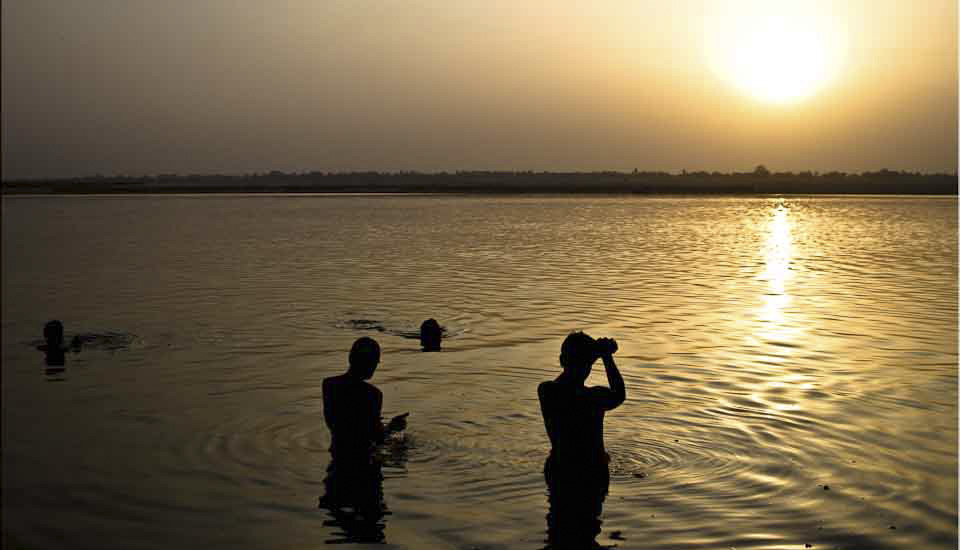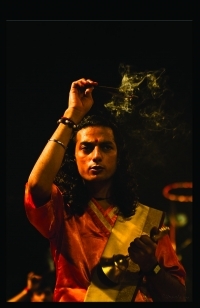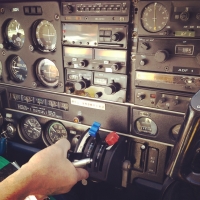.jpg)
Kara Youngster
A young girl from Dus Village, in the remote reaches of Ethiopia’s Omo Valley, meets the camera with bold confidence.
The Kara/Karo people, a small tribe of Omotic people, living on the east bank of the Lower Omo River in Ethiopia, are perhaps best known for their love of beads and face paint.
With fewer than two thousand members, the Kara are one of the smallest tribes in the region. They are related to the Hamar (see: The Hamar), and share some linguistic features and cultural practices with the Hamar-Banna-Bashada tribal cluster. The Kara fish, raise goats, and farm sorghum, trading with the Hamar and the Dassanech (see: A Daasanach Village) for other necessities.
This relationship with the Hamar is a double-edge sword, bringing the Kara into ongoing conflict with the much bigger and more aggressive Nyangatom tribe who live on the other side of the Omo River – on lands the Kara say were once theirs. As I have written before (see: The Kara of Dus Village), inter-tribal conflicts have continued for generations. Men need to show their ability to protect the village and herds, and must own an AK47 before they are allowed to marry (see: Men and Goats and Dust).
I was travelling with photographer Ben McRae on a Piper Mackay tour, and the Kara residents of Dus Village were more than welcoming to us. This area is remote, even by Ethiopian standards, with no wired electricity or running water, and certainly no “tourist accommodation”. Thanks to Grand Holidays Ethiopia, we were comfortably lodged in a mobile campsite, complete with portable toilets and showers, deep in the heart of Kara territory.
This meant we had proximity to the largest of the three Kara villages. We visited it several times (eg: Visits to a Kara Village) and spent some meaningful time with these beautiful people in their own environment.
Do join me:
.jpg)
Morning in Dus Village
It is early morning on the plateau at the edges of Dus Village. People wrapped in blankets are gathered around as the village chiefs deal with miscreants involved in a minor conflict the day before.
.jpg)
Men in the Morning
The men sit on their small stools carved from acacia wood as they await the decision of the arbitrators.

Kids in the Village
The many young children in the village are both shy and curious.

Friends in the Beads
It’s very early, and the sun is just sneaking past the conical huts.

Old Woman in Tartan Cloth

Mother and Child
Kara women often crop their hair close at the sides, tie it into knots at the top, and like the Hamar, dress it with ochre.

Mother and Children
Beads and babies are everywhere.

Elegant Young Woman
Most people are wrapped in cloths against the morning chill.

Old Woman
There is a regal bearing to these people as they go about their early morning routines.

Kara Man in Profile
They are a good looking people, …

Kara Man in Blue
… and meet the camera’s gaze unselfconsciously.

Striped Sheets and Shadows

Young Boy at a Grain Store

Boy in Ochre
Kara body art encompasses a range of styles, from smeared clay to elaborate paint. I had to admire the strong wicker weaving pattern that went into the elevated grain storage containers.

Morning on the Omo River
It is a beautiful spot on the river – but it is not an easy life.

Women at the Omo River
Kara livelihood is determined by the rhythms of the floods along the Omo River; when the inundation of water recedes, the Kara pierce the rich mud with sticks and plant their crops, using a practice little changed in hundreds of years.

Kara Woman
The morning sun shines brightly on the skin of the young women.

Ethiopian Guide
Our guide was as knowledgeable as he was good looking. Each tribe and every village has a different set of rules for visitors and pricing code for photographs, and he helped us navigate it all smoothly.

Goat among the Grain Stores
The prevalence of tsetse fly, which attacks large cattle, lead the Kara to focus on goats and sheep, which are less vulnerable. They keep a few cattle, but that meat is reserved for special occasions.

Children in Spots

Children with a Goat
The children are well aware that posing with a cute kid makes them more attractive to tourists, and they will therefore earn more birr.

Woman in Bangles
Both men and women love their jewellery. Like the Hamar, Kara women wear a goatskin smock, bordered with cowrie shells and embroidered with beads for special occasions.

Woman in Beads
It is common for Kara women, men, and even children, to wear a nail, a stick, or a piece of grass sticking out of their chin through an incision made under their bottom lip.

Beads and Circles

Woman with Grain
Kara housing is very like that of the Hamar: upright wooden poles are woven together and covered with a layer of mud, and topped with a conical roof made of straw and tree branches.

Red, Blue, and White Beads
Face paint and body paints are made from pulverised local white chalk, yellow mineral rock, red iron ore, and black charcoal.

Girl in Spots and Beads
These lovely designs are chalk and mineral rock with ochre.
The village offers up endless photographic possibilities, but it was almost nine am, and time for our breakfast.
 But, we’d be back!
But, we’d be back!
Until then,
Happy Rambling!
Photos: 21October2018
































.png)


[…] the Kara people still believe is theirs; picturing their lush green river-side crops (see: Environmental Portraits), I think the Kara got the better end of the […]